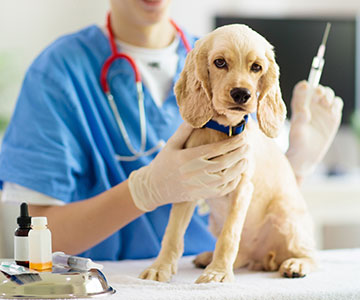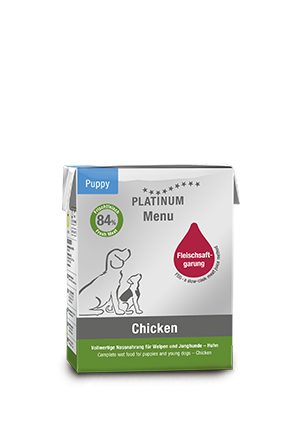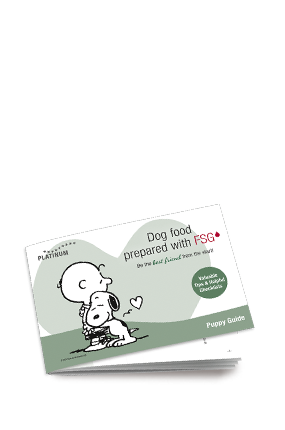Your puppy at the vet's
"Create a positive experience": This is the number one rule for your pet's first few trips to the vet. This motto lays the foundation for pleasant, stress-free visits to the vet's in the future.
Getting used to the vet's
The aim is to combine a visit to the vet with a positive experience. This will turn your puppy into a co-operative dog that can be cared for and looked after in the best possible way if an emergency arises.
This goal can be achieved, for example, through regularly visiting the vet in your first year with the vet only weighing your dog or placing them on the treatment table without any reason for it or consequences to this, after which you reward your puppy with a treat or a toy. This way, the dog associates visits to the vet with positive experiences from the outset, rather than discomfort. Discuss with your vet when such visits are best and least stressful.
Important: dogs that come from a responsible breeder have already received their first vaccination before you bring the puppy into your home.
Vaccinating your puppy
In the first few weeks of life, your puppy is protected by the antibodies in their mother's milk. If this protection wears off after the end of suckling, vaccinations are the only safe method of preventing life-threatening diseases or at least mitigating them at the outset, and thus avoiding suffering and possibly high treatment costs. Vaccinations also help protect all animals everywhere. This is because it is only possible to prevent epidemics if more than 70 per cent of dogs are vaccinated. Also, some pathogens can be transmitted from animals to humans ("zoonosis") and can be hazardous to our own health.
Complete basic immunisation in the first two years of life is the prerequisite for this optimum protection. This means that a puppy should be vaccinated at eight, twelve and sixteen weeks of age as well as at fifteen months (rabies vaccinations are only given from the twelfth week after birth). Subsequent booster vaccinations vary between annual and triennial intervals – depending on the vaccine, pathogen and region of residence.
Vaccinations are recommended for the following diseases, especially:
Hepatitis:
Infectious liver inflammation
Leptospirosis:
Bacterial infection transmitted mainly via the urine of rats and mice. It is also contagious for humans and can be fatal.
Parvovirus:
Highly contagious viral infection that comes with bloody diarrhoea plus dangerous blood count changes and is fatal for many puppies.
Distemper:
Infectious, febrile viral infection with a wide range of symptoms, including nerve damage, which can be fatal.
Rabies:
Deadly viral infection that causes inflammation of the brain and can also infect humans.


Worming your puppy
Worming is important because roundworms and tapeworms can cause damage to the dog's gastrointestinal tract. They can also weaken the animal, deprive it of vital nutrients and, depending on the type of parasite, also infect and affect other organs.
You should first worm your puppy at two weeks of age, as puppies can become infected with worms before birth and later through their mother's milk. This worming treatment should be repeated every two weeks until the puppy is weaned off its mother's milk and a second time two weeks after weaning – i.e. usually after arrival at their new home. The subsequent worming programme depends on the puppy's individual risk of infection. Alternatively, a three-day collective faecal sample can be tested for parasites at the vet's – this means you won't end up worming your puppy when they're not infected. For many dogs, a three-month interval between worming or check-ups has proven to be effective.
Shorter intervals may be necessary for dogs that are off their leash a lot, are used for hunting or pick up other animals' faeces, especially if there is close contact with small children, older people or immunocompromised persons. The worming schedule can be customised by your vet. Ideally, you should worm your dog or get a parasitological faecal examination done two weeks before a planned vaccination so that your four-legged friend will be healthy and free of parasites when the time comes.
Worming and checking for roundworms and tapeworms are important because parasites can cause damage to the dog's gastrointestinal tract – and, depending on the species, can also affect other organs.
There are various ways of worming your four-legged friend: tablets, pastes and emulsions are available that the owner can administer orally to the dog at home.
Protection against ectoparasites
Not every product is suitable for every age and for every type of parasite. Your vet will be happy to help you choose the right product.
There are many different parasites that live on the outside (Greek "ekto" for outside) of the dog's skin and hair. The two most common and somewhat easier to recognise parasites are fleas and ticks. There are also mites, which are significantly smaller than fleas. Some mite species live hidden in the skin or its hair follicles and sebaceous glands, others deep in the ear canal. Always consult a vet to get a diagnosis. Lice or hair lice are much less common in this country than the ectoparasites described above. A parasite infestation in dogs usually manifests itself with noticeable itching, restlessness or changes to the skin and coat. In rare cases, similar symptoms can also occur in humans.
When it comes to ectoparasites, you should be especially careful with ticks, as they can transmit serious, possibly life-threatening diseases. Dogs in areas with a high tick population should therefore be given tick preventatives. Fleas, on the other hand, can give your dog tapeworms. They are also extremely annoying for your four-legged friend due to the itching they cause. As the majority of fleas do not live on the dog, but in its environment, cleaning the entire house is very important if you have a flea infestation.
Careful daily checks of the skin and coat – preferably when brushing or inspecting the animal – and consistent preventive measures are essential to protect both your dog and the people and other animals in its environment from parasites and their possible consequences.
There are numerous products available for flea prevention and treatment, with varying degrees of suitability and reliability; your vet will be happy to help you choose the right product.
Product recommendation
The benefits of PLATINUM dog food
- PLATINUM uses a unique preparation method called FSG, which offers numerous advantages compared to conventional dog food.
- Dog food prepared with FSG is gently cooked only in its own meat juice and is therefore nutrient-rich like BARF, excellent for building muscles and also extra tasty for your dog.
- With at least 70% fresh meat in the dry dog food and 83% fresh meat or fresh fish in the wet dog food, PLATINUM places great value on a composition of the food that is adapted to the needs of dogs.
- The declaration and composition of dog food prepared with FSG is tested regularly and independently by ELAB Analytik GmbH (formerly TÜV SÜD ELAB) - for canine health protection.
- PLATINUM is generally very well accepted by dogs of all breeds and ages. Even four-legged friends with sensitive digestion or intolerances usually tolerate PLATINUM dog food well.
- All products are free of soya, GMOs and gluten. In addition, no flavour enhancers, attractants, odourants or colourings are used.
- Over 2,000 positive customer reviews at Trusted Shops speak for themselves!








.png)

.png)
